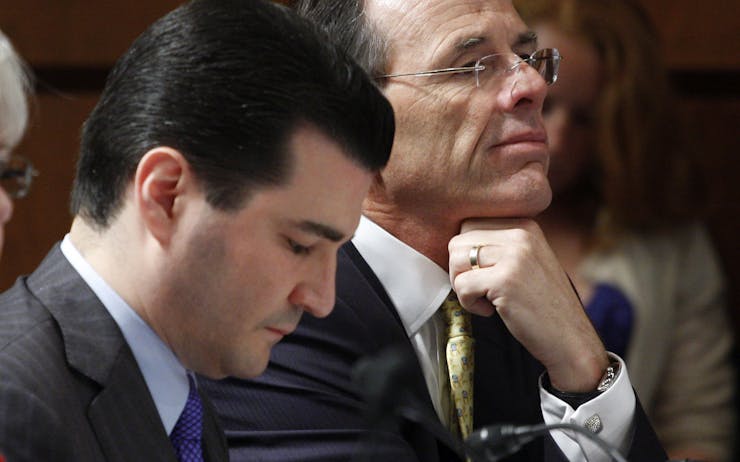President Donald Trump sent rumbles across the federal cannabis landscape with a pair of moves made late Friday, picking pharmaceutical industry insider Scott Gottlieb to lead the Food and Drug Administration and ordering the 46 remaining Obama-era US attorneys to leave their posts immediately.
Both acts have the potential to shape the national cannabis industry, both for medical patients and adult-use consumers. The appointment of Gottlieb, an FDA official under President George W. Bush, could ensure that any moves on medical cannabis continue along a traditional, pharmaceutical-minded trajectory—which to most patients has felt like stagnation. The replacement of 46 US attorneys, on the other hand, could reshuffle federal law enforcement priorities in states across the country.
Let’s start with Gottlieb. He’s one guy, so it’s easier.
In terms of cannabis, he sounds a lot like the status quo.
According to the New York Times, Gottlieb’s nomination to lead the FDA cheered the pharmaceutical and biotech industries, members of whom had expressed concern that Trump’s other rumored picks held radical views. Perhaps no surprise: Gottlieb is an industry insider himself, having served as a consultant or board member for several companies, including GlaxoSmithKline. Between 2013 and 2015 he raked in $400,000 in payments from pharmaceutical companies alone. He’s a partner at a venture capital fund that focuses on health care investments, and he holds a fellowship at the American Enterprise Institute, a conservative think tank.
In terms of cannabis, he sounds a lot like the status quo—especially when you consider that a little more than a year ago, President Barack Obama nominated for the job Robert Califf, who inspired headlines like “Anti-Cannabis, Big Pharma Companies Tied to FDA Nominee.”
There’s not much out there on what Gottlieb himself thinks of cannabis. Over the years he’s tweeted links to links studies or news items, but none appears to include any personal reaction. The tweets paint a picture of someone who has been aware—albeit skeptical—of the rise of cannabis as medicine.
Gottlieb’s control over cannabis would primarily be confined to a regulatory role. To the degree that cannabis-derived products exist as federally approved medicines, dealing with it is the FDA’s job. The group also sometimes provides medical briefings to other agencies that deal with cannabis, like the DEA.
So far the agency hasn’t approved cannabis as a medicine—“untested drugs,” it explains, “can have unknown consequences”—although it has approved two similar drugs that have been synthesized in labs. It’s likely we’ll see more of the FDA’s slow, molecule-by-molecule approach under Gottlieb, even though Trump has promised to slash many agency regulations, which he’s criticized as overly burdensome.
US Attorneys Set Prosecution Priorities
Trump’s intended replacement of 46 US attorneys poses a bigger existential threat to cannabis in legal states. While individual US attorneys set law enforcement priorities within their respective districts, they take direction from top Department of Justice brass. When US Attorney Jeff Sessions—or Trump’s press secretary, Sean Spicer—talks about the administration stepping up enforcement against state-legal cannabis markets, the prosecutors who would file those cases take orders from US attorneys in 93 jurisdictions around the country.
Shop highly rated dispensaries near you
Showing you dispensaries nearWhile replacing US attorneys, even on such a massive scale, is a fairly common move for an incoming president—Presidents Bill Clinton and George W. Bush dismissed nearly all US attorneys upon taking office—it nevertheless represents a significant shift in the cast of characters setting prosecutorial goals across the US. For cannabis, that can be cause for concern. State-legal systems are quickly becoming multibillion-dollar industries. And one thing that can put any industry on edge is uncertainty.
The extent to which DOJ undermines state marijuana laws & escalates the drug war depends on the decisions of each individual U.S. Attorney https://t.co/aR4lcWSSHn
— Bill Piper (@billjpiper) March 10, 2017
Leafly will continue to track these issues as they develop.





